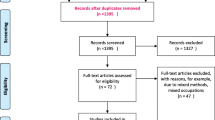Abstract
This essay describes and critically evaluates a co-operative educational program to train Ugandan health care workers in bioethics. It describes one “bottom-up” effort, a week-long intensive workshop in bioethics provided by the authors to health care professionals in a developing country—Uganda. We will describe the background and circumstances that led to the organization of the workshop, and review its planning, design, curriculum, and outcome. We will focus especially on measures taken to make the workshop relevant for the audience of Ugandan professionals, and describe lessons learned after two presentations of the workshop. Finally, we will discuss the strengths and weaknesses of such a format, and its potential value in raising bioethical expertise in developing countries.
Similar content being viewed by others

References
Ashcroft, R. E. (2005). Ethics committees and countries in transition: A fig leaf for structural violence? British Medical Journal, 331, 229–230.
Benatar, S. R. (2002). Reflections and recommendations on research ethics in developing countries. Social Science and Medicine, 54, 1131–1141.
Farmer, P. E. (2005). Pathologies of power: Health, human rights, and the new war on the poor. 2nd edition. Berkeley: University of California Press.
Macklin, R. (2004). Double standards in medical research in developing countries.Cambridge University Press, Cambridge.
Metz, T. (2007). Toward an African moral theory. Journal of Political Philosophy, 15, 321–341.
Metz, T. (2010). African and western moral theories in a bioethical context. Developing World Bioethics, 10, 49–58.
Rennie, S., & Behets, F. (2006). AIDS care and treatment in sub-Saharan Africa: Implementation ethics. Hastings Center Report, 36(3), 23–31.
Simon, C., Mosavel, M., & van Stade, D. (2007). Ethical challenges in the design and conduct of locally relevant international health research. Social Science and Medicine, 64, 1960–1969.
Author information
Authors and Affiliations
Corresponding author
Appendices
Appendix 1: Curriculum Topics
-
Introduction: What is ethics?
-
Moral deliberation: moral theories, using the principles to analyze cases
-
Culture and medicine
-
Applying ethical principles and theories in the Ugandan context
-
Research ethics I: historical abuses, regulatory codes
-
Research ethics II: issues in international research
-
Clinical trials
-
Informed consent in research and in clinical care
-
Investigator and healthcare professional integrity
-
Ethical (institutional) review boards
-
Professional responsibilities towards patients
-
Health and human rights
Appendix 2: Examples of Ethical Dilemmas Presented by Workshop Participants
-
Disclosing HIV status to family members, especially spouses (confidentiality vs. the duty to warn)
-
Testing for HIV without patient’s knowledge/permission
-
Patient refuses to know results of HIV test
-
Sero-discordant couples: breaking the news
-
Accepting bribes from patients or patients’ families
-
Extorting money from patients who are desperate for treatment
-
Refusing to treat “unclean” patients
-
Parental permission for research on children; gaining assent from children
-
Prisoners and patients without family being denied treatment because no one can purchase medications for them
-
Rationing when supplies are scarce
-
Harm to fetus from pregnant woman’s participation in research protocol
-
Is a participant who withdraws from study entitled to any continued care?
-
Continuing protocol when children object, or are in pain
-
What to do when an HIV+ patient asks for information about abortion
-
What are fair benefits for participating in research protocols?
-
Carrying on private discussions with patients in open areas
-
Giving diagnoses, test results, etc. to “caretakers” instead of patients
-
Refusing treatments of unrelated illnesses to HIV+ patients
Appendix 3: Culture and Health Discussion Topics (Small Groups)
-
Death, dying, and suicide
-
Ethnic differences in Uganda
-
Mental illness
-
Domestic violence
-
Sexuality, birth control, abortion
-
Drug/alcohol use and abuse
-
Gender roles
-
Homosexuality
Appendix 4: Group Projects
-
1.
“Develop two cases that you could present to colleagues when you return to work. Write up the cases and four discussion questions for each one.”
-
2.
“Your HIV+ female patients desire to become pregnant, senses the disapproval of your staff, and then avoid returning for prenatal care. What steps should you take in your clinic to address this problem?”
-
3.
“What are the most common ethical dilemmas in an HIV clinic in Uganda? How would you gather this data and organize it?”
-
4.
“The physicians in your hospital are planning a strike due to low wages and lack of resources for patient care. Prepare an ethical analysis of the situation. Is it ethically prohibited, permissible, or obligatory for professionals to strike?”
-
5.
“You are starting a new voluntary HIV testing clinic. What ethical issues will arise, and what policies should be established to address these problems?”
-
6.
“What ethical guidelines are necessary for setting up a “routine counseling and testing’ program in your hospital?”
-
7.
“What are the ethical issues involved in the provision of health care for homosexuals in Uganda?”
-
8.
“Prepare a 10 minute summary of the week-long workshop to present to your co-workers.”
Rights and permissions
About this article
Cite this article
Griggins, C., Simon, C., Nakwagala, F.N. et al. Bioethics Training in Uganda: Report on Research and Clinical Ethics Workshops. HEC Forum 23, 43–56 (2011). https://doi.org/10.1007/s10730-010-9144-3
Published:
Issue Date:
DOI: https://doi.org/10.1007/s10730-010-9144-3



